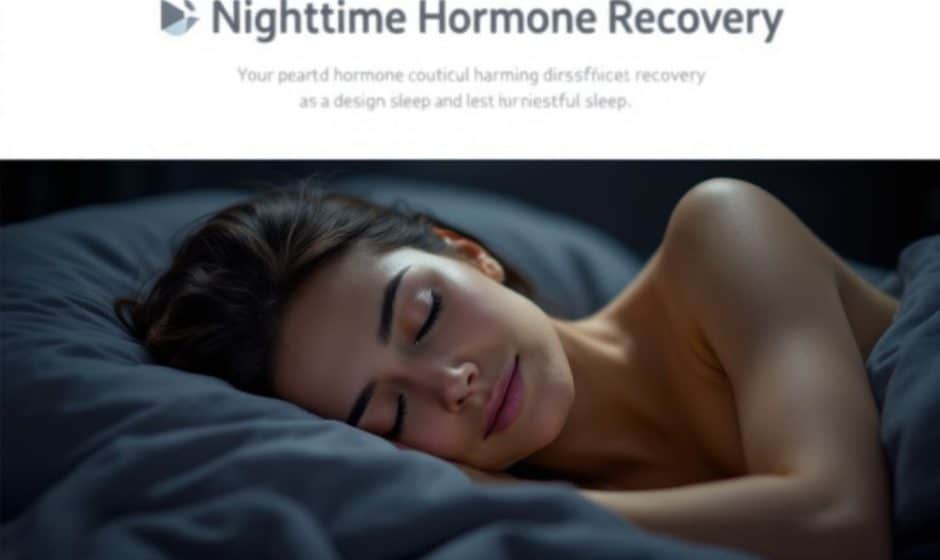Hey there! Ever wondered why sometimes you wake up feeling exhausted even after a full night’s sleep? Or maybe you feel rested, but your mood is all over the place? It might have something to do with your hormones. Don’t worry; you’re not alone in this mystery. Today, we’re diving deep into the world of “Nighttime Hormone Recovery” and how crucial it is for your sleep health. It’s a fascinating, yet often overlooked topic that can really change the way you feel. Trust me, you want to know more about this.
Understanding the Role of Hormone Regulation
Hormones regulate so much of our bodily functions, and sleep isn’t left out. These chemical messengers handle how well we drift off, how deeply we stay asleep, and how refreshed we feel when it’s time to wake. It’s essentially all about the balance—or in fancy terms, hormone regulation. Your body hits hormone-reset mode at night, and that’s when it gets down to some serious house cleaning.
Why Hormone Recovery Matters
Okay, hear me out: Imagine your body as a high-functioning machine. It needs fine-tuning to operate at its peak, and that fine-tuning happens at night. Hormones like melatonin, cortisol, and growth hormone play key roles here. Melatonin manages sleep-wake cycles, cortisol handles stress and metabolism, and growth hormone is essential for tissue growth and repair. Disrupt this harmony, and you’ve got chaos in your system. It’s the difference between waking up feeling invincible versus feeling ready to dive back into the pillows.
Crafting Your Evening Routine for Optimal Hormone Regulation
**Step One: Respect Your Body’s Natural Rhythm** Every one of us has a natural sleep-wake cycle. That’s your circadian rhythm, and it’s influenced by light exposure. Seeing sunlight in the morning kick-starts this rhythm. By evening, you should start gearing down. Dim the lights and reach that sweet spot between staying awake and melting into bed. No one-size-fits-all here, so find what timings suit your groove.

**Step Two: Create a Sleep-Inducing Atmosphere** Your bedroom should be a sleep sanctuary. Sounds lofty, I know, but it’s doable. Keep it cool—somewhere around 65°F (18°C) does wonders. Cut out the noise or use soothing sounds. If the light is sneaking in, blackout curtains are your friend. And those screens? Let’s just say they’re not on your side when it comes to hormone regulation. Blue light from devices tricks melatonin into thinking it’s party time when really, it’s expertly designed for chillin’.
Step Three: Nutrition Isn’t Just About Daytime
Get this: what you eat affects how you sleep. Crazy, right? Foods high in magnesium and vitamin B6 (hello, bananas and leafy greens) promote melatonin production. Keep dinners light and save the heavy, spicy, or sugar-loaded meals for earlier in the day. Ever heard of tryptophan? It’s not just in turkey—think nuts, seeds, and even chocolate. Yes, chocolate. But hey, moderation is key.
Common Mistakes Killing Your Hormone Recovery
- Caffeine Overload: Timing is everything. That afternoon cup-o-joe might just be that sneaky saboteur.
- Irregular Sleep Schedule: Even your body’s tiny clocks thrive on routine. Tossing and turning at different times? Not ideal.
- Underestimating Side Activities: Stressful or stimulating activities too close to bedtime can wreak havoc on hormone regulation.
Sleep-Inducing Activities to Try
Finding relaxing practices doesn’t have to be a drag. Here’s a palette of choices:
- Deep Breathing or Meditation: A few mindful moments ease your system and bring balance.
- Light Reading: Nothing too stimulating from the good ol’ phone screen. Books are where it’s at.
- Warm Bath or Shower: The rise and subsequent fall in body temperature sparks melatonin into action.
- Light Yoga or Stretching: Eye it more as a gentle wind-down than a workout session.
Encourage these routines until they flow naturally into your wind-down journey–they double as wonderfully comforting transitions.

Action Tips to supercharge Hormone Regulation
Taking action is your ace. Here’s a streamlined roadmap:
- Set Consistent Sleep Times: Stick to the same time slots, even on weekends. It’s tough but worth it.
- Optimize Bedroom Environment: Blend darkness, temperature, and air quality into peaceful bliss.
- Limit Technology Use Before Bed: Clock out an hour before sleep—movies, work chats, all of it.
- Relax and Wind-Down Earlier: Ease into your evening long before hitting the sheets. Sure, it sounds clichéd, but it’s yours to control.
Supporting Sleep Health with Lifestyle Changes

Let’s mix it up with these additional aspects that can amplify your nighttime hormone recovery:
- Regular Exercise: Do it early enough though. Late-night workouts can jolt your system instead.
- Morning Sunlight Exposure: Just 15 minutes can keep your circadian rhythm in high spirits.
- Hydration: Sip steadily through the day but ease off before bed to avoid those pesky midnight loo trips.
Staying on Track
You won’t see the magic shift overnight. Like any good habit, consistency’s your golden ticket. Don’t fuss if you can’t hit perfection every night. Life throws curveballs, and adapting is part of the journey.
Wrapping It Up
Feeling more enlightened about nighttime hormone recovery? Awesome! Remember, everyone’s rhythm dances to its own tune. Trust your gut, experiment, tweak routines, and embrace what resonates. You’re on your way to a comfortable balance between sweet elation and a truly restorative slumber.
Jump into your jammies with revamped confidence tonight, and consider the cycle. Watch how those waves of stress dwindles, energy revitalizes, and clarity blooms. It’s not just adapting knowledge—it’s embracing change. Hormones quirking out somewhat doesn’t have to steer your life.
Any personal insights or discoveries on sleep health? I’m all ears! Slip me a note sometime—I’d love to know where your path intersects hormone regulation and blissful snooze. Sweet dreams!
Frequently Asked Questions
What is hormone regulation?
Hormone regulation refers to the processes by which the body controls the production, release, and activity of hormones. This is primarily managed through negative feedback mechanisms, where rising levels of a hormone inhibit its further release, and through hormonal, humoral, and neural stimuli[5].
How do hormones travel and affect the body?
When a hormone is released from a gland, it travels through the bloodstream to reach its target cells. Once at the target cells, hormones regulate various bodily functions such as metabolism, growth, and other essential processes[1].
What are the signs of hormonal imbalance?
Signs of hormonal imbalance can include fatigue, sleeping issues, irritability, hot flashes, night sweats, changes in libido, and digestion problems. These symptoms can often be confused with signs of aging but can be addressed through hormonal balance restoration techniques such as bioidentical hormone replacement therapy (BHRT)[2].
How can exercise influence hormone regulation and therapy?
Exercise significantly enhances the effectiveness of hormone therapy by helping to balance hormone levels, manage symptoms, and improve overall well-being. Different types of exercises, such as aerobic, weightlifting, and flexibility exercises, can regulate hormones like estrogen, testosterone, and insulin, and also alleviate depression and anxiety related to hormonal imbalances[3].
References



